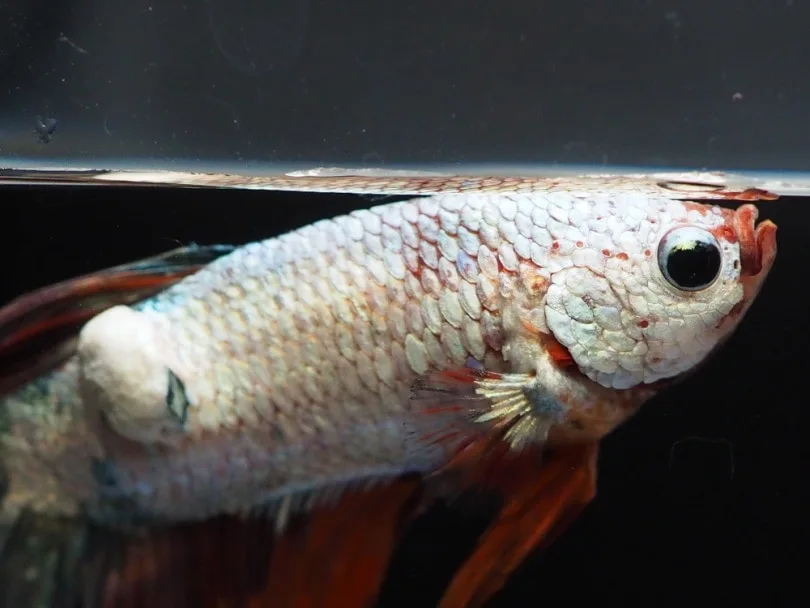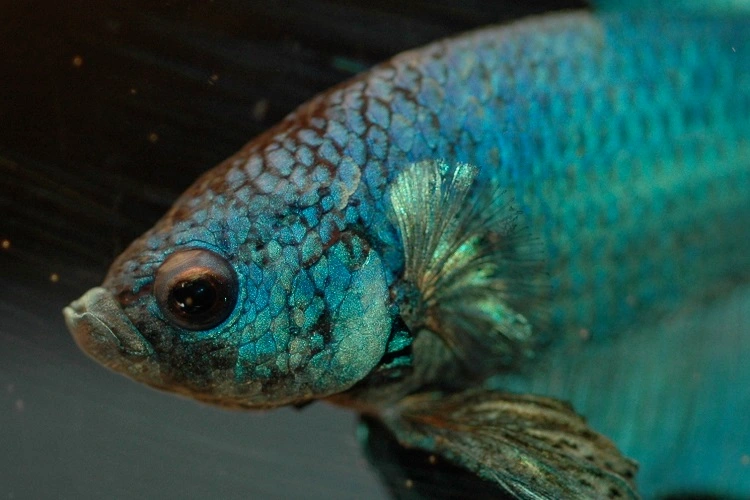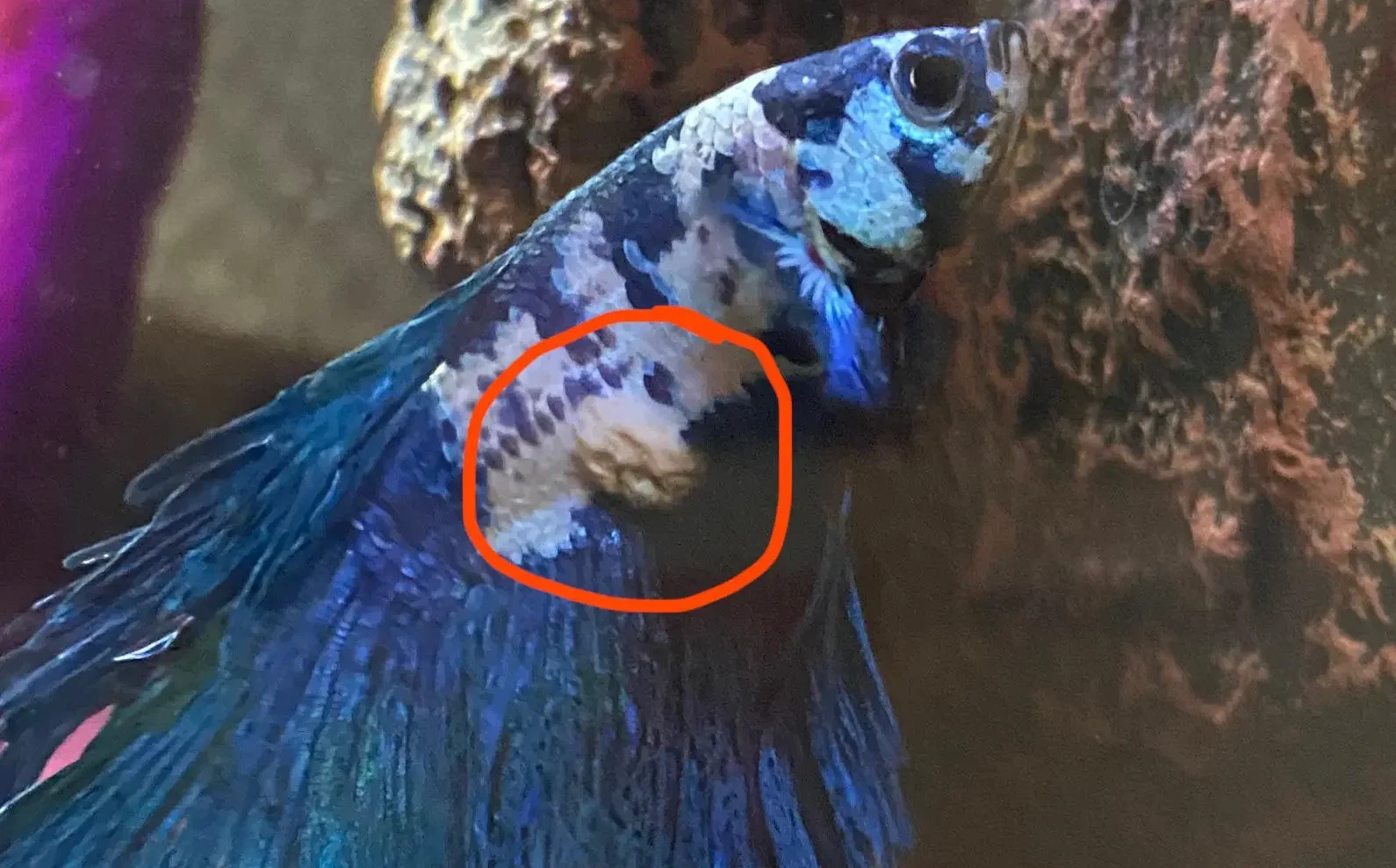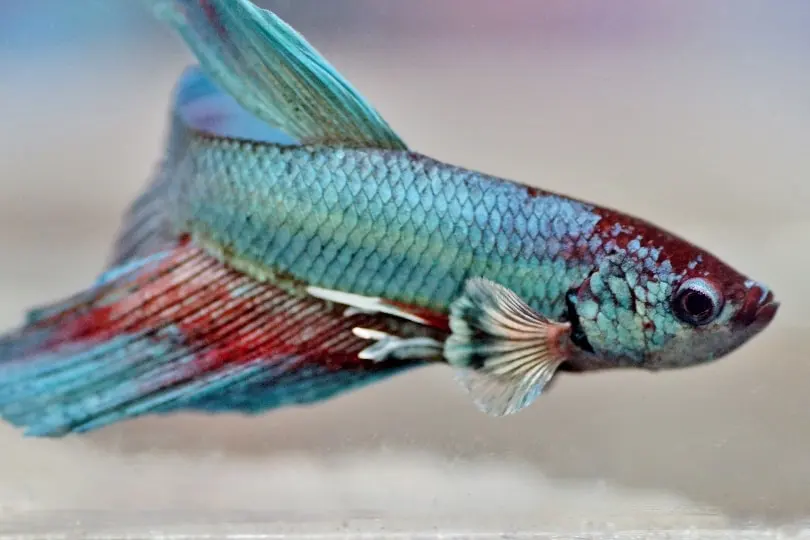Are you worried about a strange lump on your Betta fish? Many Betta fish keepers face the distressing issue of Betta fish tumors. And finding solutions to this issue can be pretty overwhelming. But don’t worry! we will help you understand the possible reasons for this lump and how to treat it. we will also discover how to determine if this is just a lump or a serious tumor.
Have you ever wondered why a lump just appeared on your Betta’s body? We’ll answer that but before, here’s what we will cover today
In this article, we will discuss what a Tumor is and what are its types. We will also discuss if a Betta fish can get a tumor or not. Additionally, we will discuss its causes, symptoms, and Treatments along with prevention measures. So, without any ado, let’s get to it.
What is Betta Fish Tumor?
A Betta fish tumor is an abnormal growth on the Betta’s body. This abnormal growth is a serious issue that severely disturbs the Betta’s well-being. An external tumor appears as a lump on your fish’s body which is clearly noticeable. However, some tumors can grow internally which makes them harder to detect and treat. So, we conclude that tumors can be external or internal. Additionally, a tumor has 2 types that are discussed as under.
Benign Tumors
A benign tumor in Betta fish is a non-cancerous growth. It can appear as a lump or a bump on the fish’s body. Generally, these tumors are less threatening compared to malignant tumors. However, they still impact the fish’s health severely.

You can identify benign tumors in Betta fish by their appearance and location. Typically, they have the same color as the fish’s scales as they can form under the skin or scales, or externally. These tumors can vary in size, and more size means more issues.
Malignant Tumor
Malignant tumors are cancerous lumps on the Betta’s body. These are comparatively less common but cause extreme damage to the fish’s health. These tumors can grow internally as well, making them harder to detect. Typically, these lumps look darker or lighter than the surrounding scales. They often have an irregular shape and rough texture.
Malignant tumors are generally more dangerous than benign tumors. These tumors spread across the fish’s body, causing significant damage. As they attack an organ, it fails to function properly.

Overall, benign tumors are less dangerous than malignant tumors. Moreover, benign tumors are non-cancerous and do not spread, whereas cancerous malignant tumors do spread rapidly and cause more damage. Cut to, the Betta fish tumor affects the Betta’s dazzling lifestyle, but the malignant tumor is more harmful than the benign tumor.
Can Betta fish Actually have Tumors?
Yes! Just like humans and many other animals, Betta fish are prone to tumors and cancer. These tumors look like extra growth or lumps of flesh. These tumors can appear on many parts of their body like the fins, gills, and internal organs. Sometimes, tumors even grow internally, leading to more damage and late detection.
There are multiple causes of tumors. Generally, the reasons behind a tumor include genetic disorders, lack of care, or infectious diseases.
Causes of Betta Fish Tumor
Now that we know what a Betta fish tumor is, let’s discuss its causes. To understand a disease, you must know the underlying reasons so you can timely avoid them. Here are the main causes of tumors in Betta fish.

- Betta fish Tumors can be caused by genetic issues. Some fishes inherit faulty genes from their parents which results in tumor development. Additionally, genetic disposition causes various health issues like albinism or susceptibility to fin rot.
- Poor living conditions like dirty tank water and lack of care can cause Betta fish tumors. Such unmaintained conditions promote bacteria and parasite growth. These bacterial and parasitic infections make the Betta prone to tumors. So, it’s best to maintain the tank to keep a healthy Betta fish with a strong immune system.
- Additionally, Bacterial and Fungal infections cause lumps that resemble Betta fish tumors. Injury is the main reason behind these lumps. Other medical conditions that cause tumor-like lumps include Columnaris and Gill Hyperplasia.
- A poor diet that lacks the required Betta nutrition can also cause lumps. Although it doesn’t directly cause tumors, it weakens the immune system. Thus, the Betta cannot defend itself from infections and health issues like tumors making it more prone to tumors
Symptoms of Betta fish Tumor
To timely detect a Betta fish tumor and treat it, you must know how it looks. After all, you can only cure a disease if you are aware of its existence. Here is a detailed guide to the Betta fish tumors detection.
Benign tumors in Betta fish
- Benign tumors mostly grow on the fins, or head and sometimes on the body. These tumors can have different sizes from small to very large.
- Benign Tumors appear as visible bumps or lumps under the skin. Typically, they have the same color as the fish’s scales.
- The infected fish might show signs of discomfort. However, it will continue normal activities and eating behavior. These lumps aren’t very harmful, but their size can affect the Betta’s normal lifestyle. If the tumor is too big, the fish might have buoyancy issues and become lethargic.

Malignant Tumors in Betta fish
- Malignant tumors can cause significant swelling and discoloration in the affected area. Typically, the malignant lump has a lighter or darker color compared to the Betta’s scales. It might even become red due to underlying inflammation.
- The lump will rapidly grow larger. You might see the tumor grow quickly in a matter of days. In such a case, the Betta’s whole body shape will become irregular.
- This tumor is extremely distressing for the fish, no matter how small. The fish will show noticeable changes in behavior and become lethargic. It might prefer hiding and reducing interaction with tankmates.
- The fish will lose its appetite and active behavior as it is struggling to survive. This will cause weight loss and a huge drop in overall health.
- The Betta will have difficulty swimming as its buoyancy will be disturbed. The fish will have a hard time swimming and maintaining their balance
- In severe cases, the tumor might cause open sores and ulcers on the Betta’s body. This will make the fish prone to secondary disease, thus further affecting its health.

Look for the above-given symptoms in your Betta fish. You can determine the type of Betta fish tumor by considering the differences. However, this is only an idea. It’s best to consult a veterinarian for such serious issues.
Lump VS Tumor in Betta Fish
To timely treat your Betta fish, you must detect a tumor. And for this purpose, you must know the difference between a regular lump and a tumor. Wondering how to do that? Here’s a quick solution to this problem.
Generally, Lumps can be caused by various issues like abscesses, cysts, and infections. To differentiate, remember that Abscesses cause pus-filled lumps with a white color. On the other hand, cysts are fluid-filled bubbles that don’t grow in size. Both of these are caused by bacterial infections.
In contrast, Betta fish tumors typically appear the same color as the fish’s scales or may be slightly discolored. They will grow, slowly if benign and quickly if malignant. However, lumps caused by other diseases don’t grow, unless infected.

Additionally, the fish will have more discomfort because of a tumor as compared to a regular lump. It will have a significant effect on their well-being and cause noticeable behavioral changes.
Treatment of Benign Tumor
Benign tumors can heal or reduce in size with proper care and treatment. However, the results are not guaranteed. The key to treating a benign tumor lies in intensive care. You just need to provide the Betta fish with optimal conditions so its immune system can fight the tumor. In the meantime, the fish should not be exposed to any other infection or disease. Here’s a guide on what you can do to treat a benign Betta fish tumor.
Isolate the Fish.
Keep the Betta fish in a separate tank to quarantine it. This will minimize stress from tankmates and provide a peaceful environment. Moreover, you could closely monitor and treat the affected fish in a focused tank.
Maintain the Ideal Tank conditions.
After isolating your fish in a separate tank, ensure the conditions are ideal. The water temperature must range between 78 to 80 degrees Fahrenheit. The Ammonia, Nitrate, and Nitrite levels must be minimal. A pH of 6.5 to 7.5 must be maintained as well.

Regularly change 20 to 25 percent water every 2 to 3 days to maintain a fresh environment. This will reduce the toxin levels and promote recovery. Additionally, maintain parameters constantly as sudden changes can be harmful to the fish.
Add Aquarium Salt
Aquarium salt can effectively reduce inflammation and prevent secondary disease. It makes a more pristine environment around you Betta fish by sterilizing the water. API Aquarium Salt for Freshwater is one of the Best Aquarium Salts for Treating Betta fish Tumors.
Administer Medication
Use medications like antibacterial treatments if you suspect an infection. Most of the time, treating the underlying condition solves the whole issue. Follow the dosage on the packaging or as prescribed. Consulting the veterinarian is best before using any medication.
Improve the Betta fish Diet.
Nutrition is vital! Improve the Betta’s diet for a quick recovery. Feed it high-quality foods that are rich in protein, to boost the immune system. Here are the best foods for Betta fish. However, avoid overfeeding to prevent further health issues.
By following the above-given guide, you will be able to effectively treat your Betta fish. However, it is important to know that the time for this treatment can vary significantly, depending on the size of the tumor. Consulting a veterinarian for a more detailed treatment plan is ideal.
Treating Malignant Tumors
Malignant tumors are harder to detect and treat. Most fish, including the Betta, have a poor prognosis in such a case. However, there’s still hope! Here are some of the tips you can use to treat your Betta fish with Malignant Tumors.
Isolate the Fish
Quarantine the fish in a separate tank. This will be a little hospital with no extra stress and an ideal environment for the fish.

Maintain Stable Parameters
Keep the water pH between 6.5 to 7.5. Maintain safe toxin levels and ensure to keep everything constant. Any sudden changes can disturb the Betta’s recovery.
Slightly Increase Temperature
For malignant Tumors, Betta fish will require slightly higher water temperatures. Maintain a temperature between 80 to 82 degrees. A higher temperature will boost the Bettas immune system so it recovers faster.
Maintain Water Quality
Perform partial water changes every 2 to 3 days to ensure a clean tank for the Betta fish. This will reduce contamination and ensure a fresh environment for the Betta. Use Aquarium salt to enhance the water quality.
Provide High-Quality Food
To support your Betta’s immune response, provide high-quality foods with a lot of protein. Shrimp, daphnia and betta pellets are ideal. Here’s a guide to the Best Betta fish Diet.

Following the above-given recommendations to comfort your fish. Unfortunately, there are no more treatments than this. Surgical removal of malignant tumors is not an option because of the low success rate and high cost.
The only thing you can do is to make sure the fish remains as comfortable as possible. Regularly monitor for any stress and try to alleviate it. The most humane way to tackle this issue is to euthanize your Betta for the greater good. Consulting a fish doc might help!
Prevention
Betta fish tumor is a serious disease that causes extreme distress to the fish and its owner. Unfortunately, if it’s genetic, there’s not much you can do. But if the underlying conditions are different, here’s a guide to prevent tumors in Betta fish.

- Maintain optimal tank conditions. Keep the tank parameters constant.
- Prevent Fungal or Bacterial infections by maintaining a clean and hygienic tank.
- Maintain safe Ammonia, Nitrate, and Nitrite levels. Ensure the tank is free of toxins and cancer-causing chemicals
- Provide your fish with an ideal diet. Make a feeding routine and follow it so that your fish has a healthy immune system. This way its body can defend itself.
- Minimize stress in the tank. Remove any aggressive tankmates and make multiple hiding spots in the tank. Mimic the Betta’s natural habitat to provide a home-like environment.
A good tank, feeding routine, and some luck will ensure your Betta’s good health. Focus on preventing such diseases rather than contemplating them afterward. Issues like cancer and tumors in Betta fish surely cause trauma to the owner. However, everything has a reason. So, it’s best to move on and look forward, there are more fish in the sea!
FAQ’s
How long can a betta live with a tumor?
The answer actually depends on the severity of the case. If a Betta has a benign tumor, it is treatable and the Betta will survive if proper care is provided. However, malignant tumors can cause a quick death. Some reports say that fish with minimal tumors can survive for months or even years!
What to do if your fish has a tumor?
Provide proper treatment. Read the article given above and administer the initial treatment. If the fish does not respond positively, visit the veterinarian.
What does a fish Tumor look like?
A tumor is like a lump or bump on the fish’s body. It looks like an extra growth. To understand more about the appearance of a Betta fish tumor, consider the article given above.
Conclusion
In conclusion, Betta fish tumors are serious for the fish and their owners. However, such issues can be prevented with proper care and maintenance. Unless the disease is due to genetic dispositions, you can prevent it from attacking your Betta. You only need to keep the tank clean and stress-free. Additionally, you should manage a proper diet for your Betta fish.
All in all, Tumors are extra growths like bumps and lumps in Betta fish. They appear either on the body or in the body of the fish. If they are benign, they are treatable. However, if the tumor is malignant, your Betta fish has a low chance of survival. Give the treatment section a thorough read to find out how you can treat this disease.
While dealing with fish health issues can be distressing, focusing on prevention and early intervention can help keep your Betta fish happy and healthy. If you have any concerns, don’t hesitate to reach out to a fish health specialist. Together, we can ensure that our Betta fish live long, vibrant lives.
Let me ask: Have you ever successfully treated a Betta fish tumor? Share your thoughts and experience in the comments below!

